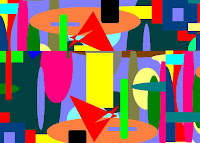Israel & South Africa: The Apartheid Connection
The Guardian's Chris McGreal, who spent years in Jerusalem and Johannesburg, writes the first of a two-part series on Israel's policies that are reminicent of apartheid South Africa. This is one of the most detailed and informative accounts that I have read, as it addresses various aspects of this phenomenon. Here are som excerpts:
Jerusalem's council forces Rhateb to pay substantial property taxes on his house but that does not give him the right to live in it, and he is periodically arrested for doing so. Rhateb's children have been thrown out of their Jerusalem school, he cannot register a car in his name - or rather he can, but only one with Palestinian number plates, which means he cannot drive it to his home because only Israeli-registered cars are allowed within Jerusalem - and he needs a pass to visit the centre of the city. The army grants him about four a year.
There are few places in the world where governments construct a web of nationality and residency laws designed for use by one section of the population against another. Apartheid South Africa was one. So is Israel.
As far back as 1961, Hendrik Verwoerd, the South African prime minister and architect of the "grand apartheid" vision of the bantustans, saw a parallel. "The Jews took Israel from the Arabs after the Arabs had lived there for a thousand years. Israel, like South Africa, is an apartheid state," he said. It is a view that horrifies and infuriates many Israelis.
"Apartheid was an extension of the colonial project to dispossess people of their land," said the Jewish South African cabinet minister and former ANC guerrilla, Ronnie Kasrils, on a visit to Jerusalem. "That is exactly what has happened in Israel and the occupied territories; the use of force and the law to take the land. That is what apartheid and Israel have in common."
According to the Israeli human rights group, B'Tselem, Jerusalem's Jewish population, who make up about 70% of the city's 700,000 residents, are served by 1,000 public parks, 36 public swimming pools and 26 libraries. The estimated 260,000 Arabs living in the east of the city have 45 parks, no public swimming pools and two libraries.









0 Comments:
Post a Comment
<< Home